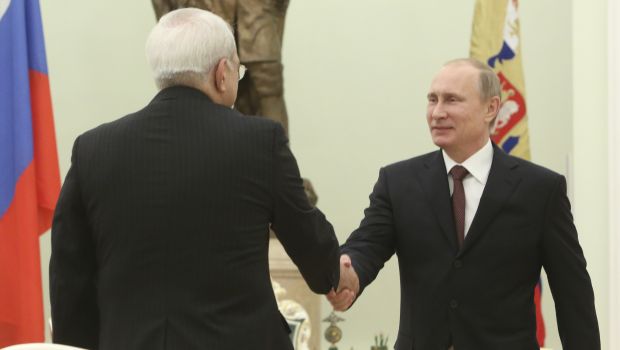
Russian President Vladimir Putin (R) welcomes Iran’s Foreign Minister Mohammad Javad Zarif as they meet in the Kremlin in Moscow on January 16, 2014. (SERGEI KARPUKHIN/AFP)
The crisis in Ukraine and the Crimean Peninsula may affect the talks between Iran and the P5+1, the five permanent members of the UN Security Council plus Germany. One possibility is that Russia may act as a “spoiler” in the talks with Iran should the United States and the European Union decide to punish Russia for violating Ukraine’s sovereignty and for destabilizing the region. What the international community is willing to do also largely depends on what aggressive measures President Vladimir Putin’s Russia is willing to undertake in the aftermath of the March 16 referendum in Crimea, which would set the stage for Crimea’s secession.
The best possible outcome is that Putin will seek to keep the two issues separate and instruct his Minister of Foreign Affairs, Sergey Lavrov, to continue to act as a somewhat reliable partner in the P5+1 talks with Iran. In this case, Russia would refrain from encouraging Iran to either walk away from the Geneva framework agreed last November or to stop cooperating with international bodies such as the International Atomic Energy Agency as they seek to verify Iran’s compliance with the preliminary agreement. After all, a peaceful resolution to the Iranian nuclear crisis would be in Russia’s regional interests, as a belligerent and obstinate Iran could lead to serious consequences.
US President Barack Obama has spent plenty of political capital in order to keep negotiations with Iran alive—he has already had to withstand attacks from Israeli Prime Minister Benjamin Netanyahu and defuse a coup in Congress by some of the most senior members of his own party. Should Iran deviate from the framework of internationally agreed terms, the US would be forced to consider other means of stopping the Iranian nuclear program, especially one whose peaceful nature cannot be verified.
Nonetheless, Russia can cause plenty of headaches for the West when it comes to Iran’s nuclear program. It is no secret that hardliners in Iran have been unhappy with concessions made by the government of President Hassan Rouhani in order to ease the pain stemming from economic sanctions and to escape from the depths of international isolation. Preparing for hard times down the road, the hardliners in Tehran and Supreme Leader Ayatollah Ali Khamenei have called for “economic jihad”: a set of extreme austerity measures designed to help Iran’s economy weather further storms—storms that will only grow stronger in the face of renewed international sanctions and Iranian belligerence.
What can the Kremlin offer Iran if it does seek to obstruct the nuclear talks? Russia can give some financial relief to Iran, but it will be very limited. Western sanctions on Russia could mean an ailing Russian economy and limited supplies of cash available to be thrown at foreign allies. Also, Russia’s track record of providing cash-strapped allies with financial support is not stellar. It was under the ousted Kremlin-friendly Ukrainian President Viktor Yanukovych that Russia demanded higher prices from the Ukraine for its energy supplies and, in effect, pushed the Ukrainian government further into a financial free-fall.
However, Russia can provide Iran with long-sought-after military hardware to fortify its sensitive nuclear and military facilities: the advanced long-rang S-300 surface-to-air missile system, and even the more sophisticated S-400 short-range air defense system. New batteries of these missiles in Iran would mean heavier losses in any US military campaign against a belligerent Iran, which would be much more difficult to stomach.
Russia is an important and powerful player on the international scene, but with great power comes great responsibility. Russia’s irresponsible behavior in Ukraine must have consequences, and the world should be prepared to face the challenges of aggressive Russian policy, be it in Iran, Syria or Venezuela.
This article was originally published in The Majalla.
All views expressed in this blog post are those of the author and do not necessarily represent the views of, and should not be attributed to, The Majalla magazine or Asharq Al-Awsat newspaper.
